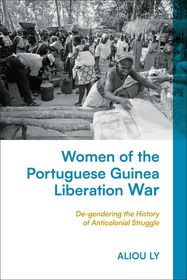
Women of the Portuguese Guinea Liberation War
De-gendering the History of Anticolonial Struggle
-
10% KEDVEZMÉNY?
- A kedvezmény csak az 'Értesítés a kedvenc témákról' hírlevelünk címzettjeinek rendeléseire érvényes.
- Kiadói listaár GBP 28.99
-
13 849 Ft (13 190 Ft + 5% áfa)
Az ár azért becsült, mert a rendelés pillanatában nem lehet pontosan tudni, hogy a beérkezéskor milyen lesz a forint árfolyama az adott termék eredeti devizájához képest. Ha a forint romlana, kissé többet, ha javulna, kissé kevesebbet kell majd fizetnie.
- Kedvezmény(ek) 10% (cc. 1 385 Ft off)
- Kedvezményes ár 12 465 Ft (11 871 Ft + 5% áfa)
Iratkozzon fel most és részesüljön kedvezőbb árainkból!
Feliratkozom
13 849 Ft

Beszerezhetőség
Még nem jelent meg, de rendelhető. A megjelenéstől számított néhány héten belül megérkezik.
Why don't you give exact delivery time?
A beszerzés időigényét az eddigi tapasztalatokra alapozva adjuk meg. Azért becsült, mert a terméket külföldről hozzuk be, így a kiadó kiszolgálásának pillanatnyi gyorsaságától is függ. A megadottnál gyorsabb és lassabb szállítás is elképzelhető, de mindent megteszünk, hogy Ön a lehető leghamarabb jusson hozzá a termékhez.
A termék adatai:
- Kiadó Zed Books
- Megjelenés dátuma 2025. november 27.
- Kötetek száma Paperback
- ISBN 9781350383081
- Kötéstípus Puhakötés
- Terjedelem oldal
- Méret 234x156 mm
- Nyelv angol 700
Kategóriák
Hosszú leírás:
Drawing on rich archival sources and summarizing extensive interviews with women who participated in the Portuguese Guinea Liberation War as spies, guerrilla fighters, and weapons transporters, this open access book helps correct an egregious gender bias in contemporary accounts of a major episode in 20th-century African decolonization.
Here Aliou Ly outlines how both popular an scholarly accounts of Portugual's defeat in 1974, which ultimately led to Portugal's abrupt withdrawal from their African colonies, continue to focus on the charisma of male leaders and on male-dominated high politics and ideology. Yet as Ly finds, women were often more active and effective than men during the war, and this because their motives for participating were more concrete. Unlike most male participants, for example, many women joined the struggle in order to help fight for their families' food security.
Yet their contributions were often overlooked or outright betrayed, as women faced discrimination both during the war and immediately afterwards. They had to fight internally to be able to engage in active combat, and they returned to home to find that they were expected to take a back seat in the post-independence era, a trend that continues to this day.
The ebook editions of this book are available open access under a CC BY-NC-ND 4.0 licence on bloomsburycollections.com. Open access was funded by the Bloomsbury Open Collections Library Collective.
Tartalomjegyzék:
Introduction
Chapter 1. Colonial Policies and Women in Portuguese Guinea 1938-1962
Chapter 2. Female Work and Participation in the Armed Struggle in Portuguese Guinea
Chapter 3. Female Combatants and Portuguese Guinea National Liberation War Narratives: Do They Tell the Whole Story?
Chapter 4. Gendering War Space and Heroinization of Female Fighters
Chapter 5. Gender Roles and the First Republic
Chapter 6. Conclusion




